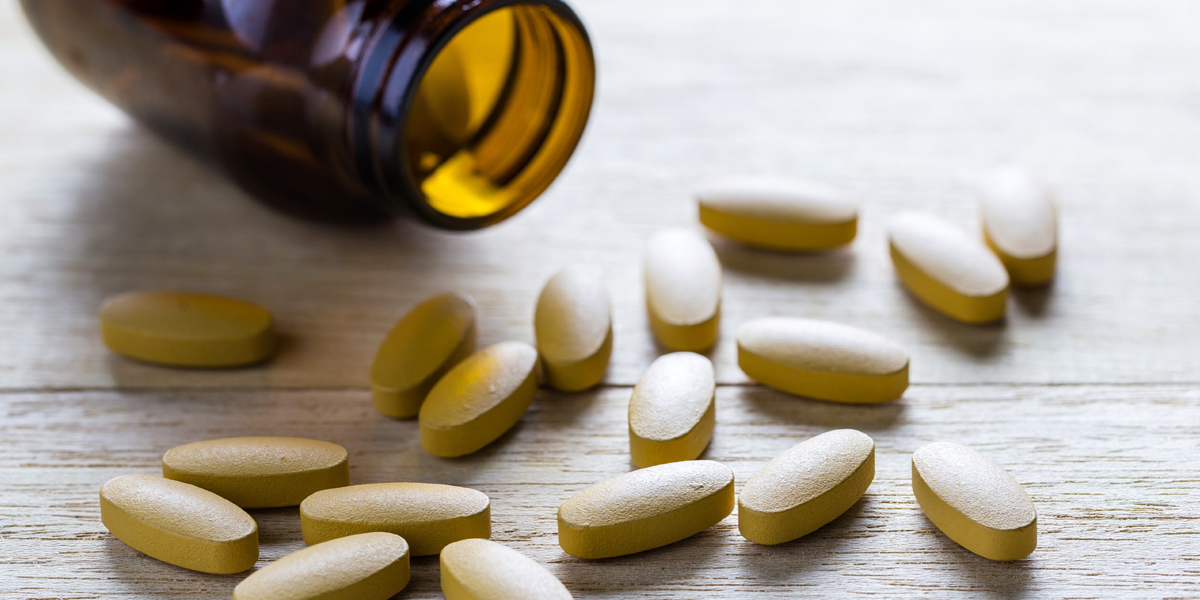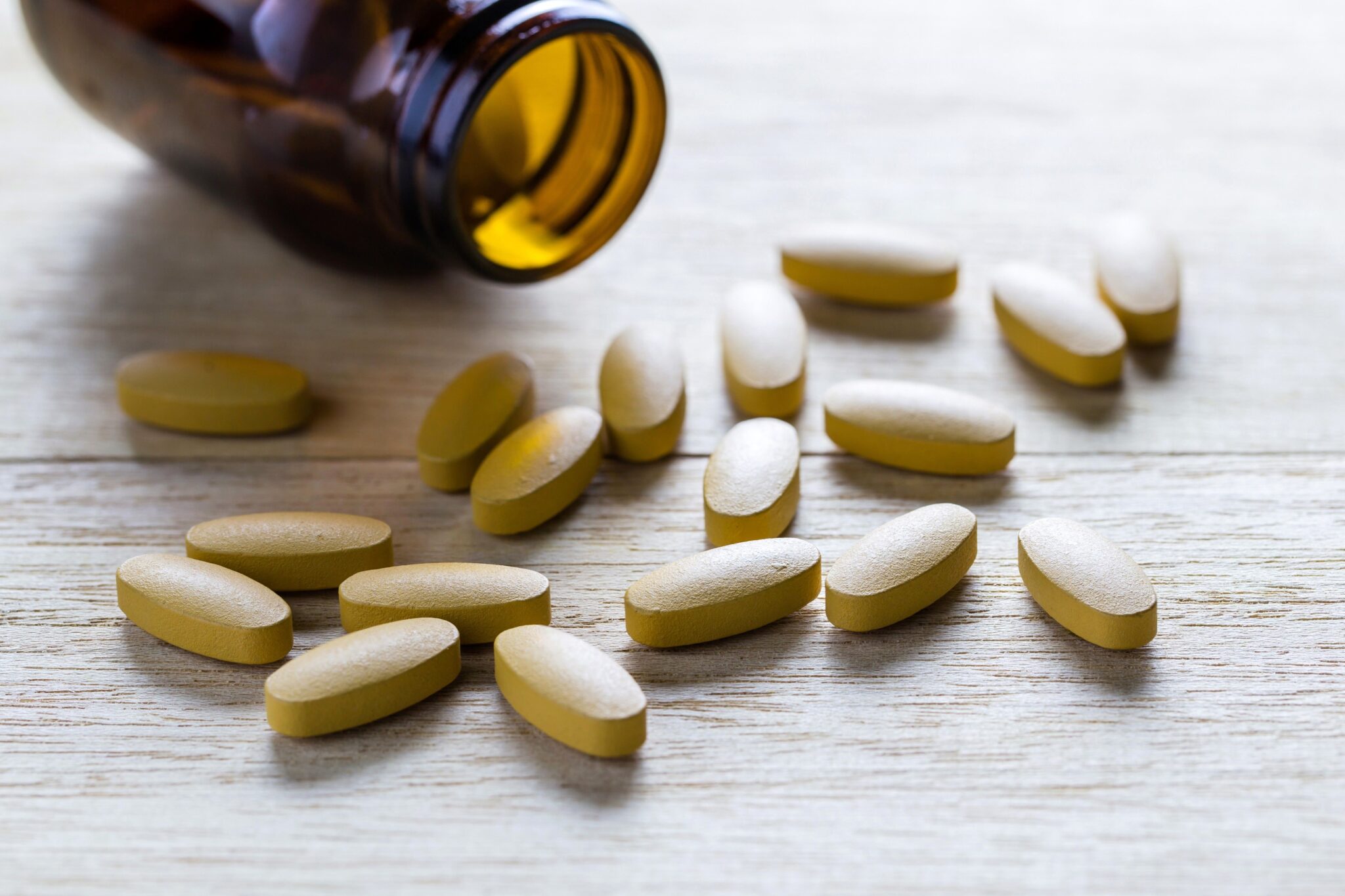

By Hrefna Palsdottir
Biotin is a water-soluble B-vitamin that helps your body convert food into energy.
It is especially important during pregnancy and breastfeeding.

In addition, biotin is important for the health of your hair, skin and nails.
This article explains everything you need to know about biotin, including its seven main health benefits.
What Is Biotin?
Biotin is one of the B-vitamins, also known as vitamin B7.
It was once called coenzyme R and vitamin H. The H stands for Haar und Haut, which is German for hair and skin.
Biotin is water-soluble, which means the body doesn’t store it. It has many important functions in the body.
It’s necessary for the function of several enzymes known as carboxylases. These biotin-containing enzymes participate in important metabolic pathways, such as the production of glucose and fatty acids (1).
A commonly recommended intake is 5 mcg (micrograms) per day in infants and 30 mcg in adults. This goes up to 35 mcg per day in breastfeeding women.
Biotin deficiency is fairly rare. However, some groups—such as pregnant women—may experience it in mild forms (2).
Eating raw eggs may also cause a deficiency, but you would need to eat a lot of eggs for a very long time. Raw egg whites contain a protein called avidin, which binds to biotin and prevents its absorption. Avidin is inactivated during cooking.
Summary: Biotin is a water-soluble B-vitamin that’s important for energy metabolism. Deficiency is quite rare, although it has been associated with the long-term consumption of raw eggs.
1. Plays a Key Role in Macronutrient Metabolism
Biotin is important for energy production. For example, several enzymes need it to function properly (1).
These enzymes are involved in carb, fat and protein metabolism. They initiate critical steps in the metabolic processes of these nutrients.
Biotin plays a role in:
- Gluconeogenesis: This metabolic pathway enables glucose production from sources other than carbs, such as amino acids. Biotin-containing enzymes help initiate this process (3).
- Fatty acid synthesis: Biotin assists enzymes that activate reactions important for the production of fatty acids (4).
- The breakdown of amino acids: Biotin-containing enzymes are involved in the metabolism of several important amino acids, including leucine (5).
Summary: Biotin assists in energy production. It supports a number of enzymes involved in the metabolism of carbs, fats and protein.
2. May Help Brittle Nails
Brittle nails are weak and easily become chipped, split or cracked.
It’s a common condition, estimated to affect around 20 percent of the world’s population (6).
Biotin may benefit brittle nails (7).
In one study, 8 people with brittle nails were given 2.5 mg of biotin per day for 6 to 15 months. Nail thickness improved by 25 percent in all 8 participants. Nail splitting was also reduced (8).
Another study of 35 people with brittle nails found 2.5 mg of biotin per day for 1.5 to 7 months improved symptoms in 67 percent of participants (9).
However, these studies were small and more research is needed.
Summary: Brittle nails are fragile and easily become split or cracked. Biotin supplements may help strengthen the nails.
3. Good for Your Hair
Biotin is often associated with increased hair growth and healthier, stronger hair.
Surprisingly, there is very little evidence to support this.
However, a deficiency in biotin may lead to hair loss, which indicates that the vitamin is important for hair (2, 10).
While it is often marketed as an alternative treatment for hair loss, only people with an actual biotin deficiency get significant benefit from supplementing (11).
Whether it improves hair growth in healthy people has yet to be determined.
Summary: Biotin is claimed to promote hair growth and healthy hair, but the evidence is weak. However, deficiency has been linked to hair loss and those who are actually deficient may benefit from supplementing.
4. Plays a Role During Pregnancy and Breastfeeding
Biotin is important during pregnancy and breastfeeding. These life stages have been associated with an increased requirement for this vitamin (12, 13).
In fact, it has been estimated that up to 50 percent of pregnant women may develop a mild biotin deficiency. This means that it may start to affect their well-being slightly, but isn’t severe enough to cause noticeable symptoms (14, 15, 16).
Deficiencies are thought to occur due to the faster biotin breakdown within the body during pregnancy (17).
Additionally, a major cause for concern is that animal studies have found that a biotin deficiency during pregnancy may cause birth defects (18, 19, 20).
Nevertheless, remember to always consult your doctor or dietitian/nutritionist before taking supplements during pregnancy and while breastfeeding.
Summary: If you’re pregnant or breastfeeding, your biotin requirements may go up. Up to 50 percent of women may get less of this vitamin than they need during pregnancy.
5. May Lower Blood Sugar Levels in Diabetics
Type 2 diabetes is a metabolic disease. It’s characterized by high blood sugar levels and impaired insulin function.
Researchers have studied how biotin supplements affect blood sugar levels in type 2 diabetics.
Some evidence shows biotin concentrations in blood may be lower in people with diabetes, compared to healthy individuals (21).
Studies in diabetics given biotin alone have provided mixed results (21, 22).
However, several controlled studies indicate that biotin supplements, combined with the mineral chromium, may lower blood sugar levels in some people with type 2 diabetes (23, 24, 25, 26).
Summary: When combined with chromium, biotin may help lower blood sugar levels in people with type 2 diabetes.
6. May Benefit the Skin
Biotin’s role in skin health isn’t well understood. However, it is known that you may get red, scaly skin rashes if you’re deficient (27, 28).
Some studies also suggest that biotin deficiency may sometimes cause a skin disorder called seborrheic dermatitis, also known as cradle cap (29, 30).
Biotin’s role in skin health may be related to its effect on fat metabolism, which is important for the skin and may be impaired when biotin is lacking (27).
There is no evidence showing that biotin improves skin health in people who aren’t deficient in the vitamin.
Summary: People with a biotin deficiency may experience skin problems. However, there is no evidence that the vitamin has benefits for skin in people who aren’t deficient.
7. Affects Multiple Sclerosis
Multiple sclerosis (MS) is an autoimmune disease. In MS, the protective covering of nerve fibers in the brain, spinal cord and eyes is damaged or destroyed (31).
This protective sheath is called myelin and biotin is thought to be an important factor in producing it (32).
A pilot study in 23 people with progressive MS tested the use of high doses of biotin. More than 90 percent of participants had some degree of clinical improvement (33).
While this finding needs much more study, at least two randomized controlled trials have been carried out in people with progressive MS. The final results have not been published, but the preliminary results are promising (34, 35, 36).
Summary: High biotin doses hold promise for treating multiple sclerosis, a serious disease that affects the central nervous system.
Which Foods Contain Biotin?
Biotin is found in a wide variety of foods, so an actual deficiency is rare.
Foods that are particularly good sources include:
- Organ meats, such as liver and kidney
- Yeast
- Egg yolks
- Cheese
- Legumes, such as soybeans and peanuts
- Leafy greens
- Cauliflower
- Mushrooms
- Nuts and nut butters
In addition, your gut bacteria produce some amount of biotin. It’s also available as a supplement, either on its own or as a component of mixed vitamin supplements.
Summary: Many foods contain significant amounts of biotin and it is also available as a supplement. Your gut bacteria can also produce it.
Safety and Side Effects
Biotin is considered very safe. Even mega doses of up to 300 milligrams daily to treat multiple sclerosis have not led to adverse side effects (33).
To put this in perspective, 300 milligrams is 10,000 times the commonly recommended 30 microgram dose for adults.
Because it’s a water-soluble vitamin, excess amounts are excreted in urine.
However, there have been some reports of high-dose biotin causing strange results on thyroid tests, so check with a doctor before using if you are currently taking thyroid medication (37).
Summary: Biotin appears very safe, even at extremely high doses. There are no known side effects of supplementing with biotin.
The Bottom Line
Biotin is a B-vitamin that plays a crucial role in carb, fat and protein metabolism.
Many of its potential health benefits are based on weak evidence. Nonetheless, it may be important for your skin, hair and nails.
Additionally, pregnant or breastfeeding women may require more biotin. High doses are also being investigated as a potential treatment for multiple sclerosis.
You can find biotin in a wide variety of foods, so actual deficiency is very rare.
For this reason, supplements probably have no significant benefits for healthy people who eat a balanced diet based on real food.
Reposted with permission from our media associate Authority Nutrition.

 233k
233k  41k
41k  Subscribe
Subscribe 